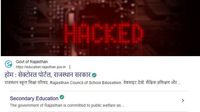On April 29, 2025, a serious cybersecurity breach occurred in Rajasthan, India, when Pakistani hackers targeted and defaced three government websites, including the official portal of the Education Department. The attacks, which were carried out over two days, involved the hackers posting inflammatory anti-India messages and threats, raising alarms about the rising threat of cyber warfare amid ongoing geopolitical tensions.
The latest attack on the Education Department's website prompted immediate action from state authorities. Rajasthan Education Minister Madan Dilawar took notice of the breach and activated the Department's Information Technology wing to initiate recovery and security enhancement measures. As a precaution, the compromised website has been temporarily shut down while restoration efforts are underway.
In response to the cyberattacks, cybersecurity agencies have been notified, and a detailed investigation is currently being conducted to identify the hacking group responsible and evaluate the extent of the breach. So far, officials have not confirmed any sensitive data leaks, but they are conducting a comprehensive security audit of all departmental systems.
This incident follows a similar cyberattack on April 28, 2025, where hackers breached the websites of the Department of Local Self Government (DLB) and the Jaipur Development Authority (JDA). Both sites were defaced with pro-Pakistan propaganda but have since been restored. The hackers, who claimed to be part of the 'Pakistan Cyber Force', posted disturbing messages referencing the recent terror incident in Pahalgam, suggesting it was an "inside job" orchestrated by the Indian government.
One of the threatening messages stated: "You lit the fire. Now get ready to melt. The next blow will not be bullets, but a digital attack. The tea is excellent. No limits. No warning. No mercy." Such statements underscore the alarming nature of these cyberattacks and the potential implications for national security.
In a related incident, the Education Department's website was reportedly hacked early on April 29, 2025, with attackers posting a message that read: "Pahalgam was not an attack. It was an inside job, a false flag operation orchestrated by the Indian government to provoke war and divide people based on faith. You started the fire. Now be ready to melt. The next strike won’t be with bullets, but with a digital assault. No borders. No warnings. No mercy. Open your eyes. Question your heroes. Your intelligence agencies are fake. Your security is an illusion. The countdown has begun."
These incidents highlight the urgent need for enhanced cybersecurity measures across government platforms. Minister Madan Dilawar assured the public that the Education Department's website would be restored soon and emphasized that robust steps would be taken to strengthen cybersecurity infrastructure to prevent future breaches.
The attacks not only reveal vulnerabilities in the digital defenses of government websites but also reflect the growing trend of cyber warfare as a tool for political and ideological conflict. As tensions between India and Pakistan continue, the implications of such cyber threats could have far-reaching consequences.
In the wake of these attacks, experts are calling for a comprehensive review of cybersecurity protocols within government agencies. The need for improved digital defenses has never been more apparent, as the line between physical and cyber warfare increasingly blurs.
As the investigation unfolds, authorities are determined to track down the responsible hacking group and ensure that measures are put in place to safeguard sensitive information from future attacks. The incident serves as a wake-up call for state governments to bolster their cybersecurity frameworks and respond effectively to the evolving landscape of cyber threats.
In conclusion, the recent cyberattacks on Rajasthan government websites illustrate the pressing need for enhanced cybersecurity measures in an era where digital warfare is becoming a reality. With geopolitical tensions on the rise, the focus on strengthening digital defenses is more critical than ever.

